Guest column: Get out and march for science
Published 12:00 am Friday, April 13, 2018

- Guest Column
On Saturday, Bend will join more than 70 cities around the world, from Washington, D.C., to Abuja, Nigeria, in the second annual March for Science. We at the March for Science know you might be getting a little tired of lacing up your sneakers. After all, this year Bend has already taken to the streets for a “reprise” march — the Women’s March in January — and for a new cause, the March for Our Lives advocating gun control in response to the Parkland, Florida, shooting.
You might not feel science is as urgent an issue, especially compared to protecting the lives of schoolchildren. You might also be accustomed to thinking of science as a handful of dry school subjects, like biology and chemistry, or as an arcane activity done by a rare few people in labs. Is it really important that we take to the streets a second year for that?
Trending
The short answer: It’s more than important. It is vital. The slightly longer answer involves 1850s London, a public water pump, beer (oddly enough) and a man named John Snow.
No, not the Game of Thrones guy. John Snow was a 19th-century physician and epidemiologist, and an early scholar and proponent of anesthesia. But it was in 1854, when a cholera outbreak was ravaging one of the poorer districts of London, that Snow made the contribution to medicine that most people (though still too few) know him for: the shutdown of the Broad Street pump.
At that time, the prevailing theory of infectious disease was that it was caused by “miasmas,” or unhealthful air. Snow had his doubts about the miasma theory. When a particularly virulent outbreak of cholera in the Soho neighborhood killed more than 600 people in three weeks, Snow spoke to residents and studied the pattern of the outbreak. He learned, among other things, that workers at a brewery in Soho seemed immune to the outbreak. Interestingly, they were given a daily allotment of beer, and, therefore, did not drink the neighborhood water. This is not to suggest that the brewery workers were the breakthrough … but Snow did pinpoint one water pump on Broad Street as the source. Armed with this information, he persuaded city authorities to break off the pump handle, and cholera rates plummeted.
This isn’t just a nice story about Great Moments in Science (or, to a lesser extent, Great Moments in Beer). The larger lesson about the Broad Street pump is that scientists aren’t a powerful body of elites dictating laws to everyone else. Often, science is the opposite: one person refusing to accept the prevailing wisdom, instead following the evidence wherever it leads and then taking direct action to save lives.
Today, we need to break off a different kind of pump handle. There’s an endless flow of misinformation from people in power, many of whom stand to profit from a miseducated population. That’s why the march is important — because when the information that scientists provide is redacted, cherry-picked or outright scrubbed from government websites, people will suffer. This hampers the ability of science to lengthen lives, alleviate pain, feed the hungry and provide answers to some of the most urgent problems humanity faces.
Science doesn’t belong to the left or the right — it’s too big for that. We all need it, and we all need to defend it. We need every pair of feet, every voice, every mind. We’ll hope to see you there.
Trending
— Jodi Compton is a volunteer for the Bend March for Science, which begins at 10 a.m. Saturday at the Drake Park amphitheater.








